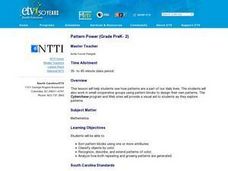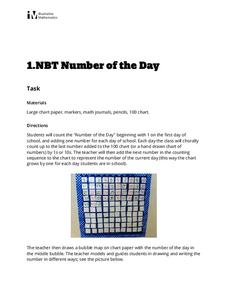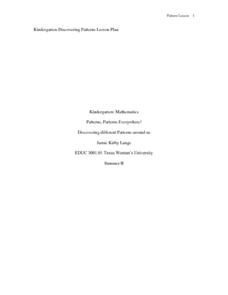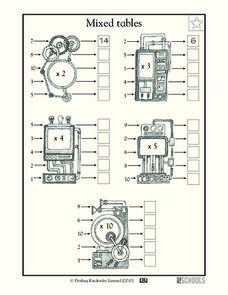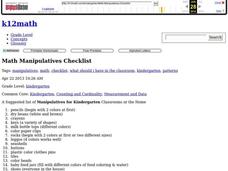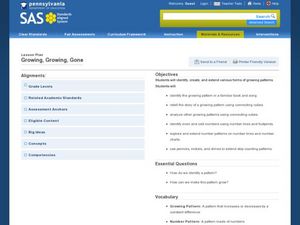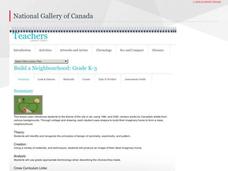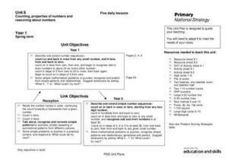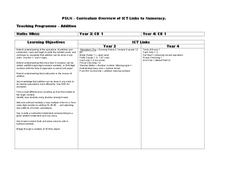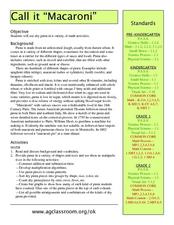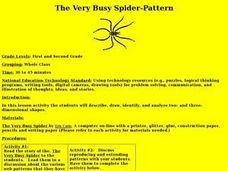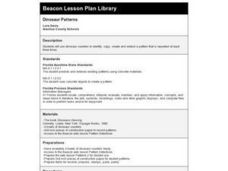Curated OER
Pattern Power
Young elementary students will discover there are patterns all around them in their daily lives. In groups, they sort pattern blocks by size and color. Using the internet, they create their own type of patterns and share them with the...
K-5 Math Teaching Resources
Pattern Blocks
Who needs to buy pattern blocks when you have this printable pattern block template? Including triangles, squares, trapezoids, rhombuses, and hexagons, this resource offers endless possibilities for teaching children about geometric shapes.
Illustrative Mathematics
Number of the Day
Daily routines not only help to manage classrooms, they can also provide learners with rich opportunities for learning. This activity supports young learners in developing their number sense by counting up the school days on a class...
K12 Reader
Extending Patterns
2, 4, 6, 8. What comes next? This reading comprehension worksheet discusses patterns and extending patterns. After reading the short article, kids answer a series of questions to demonstrate their understanding of the passage.
Texas Woman’s University
Patterns, Patterns Everywhere!
Not only is pattern recognition an essential skill for young children to develop, it's also a lot of fun to teach! Over the course of this lesson, class members participate in shared readings, perform small group...
Mississippi State University
The Five Senses
Your learners engage their five senses every day without knowing it. Help them identify their experiences and extend their understanding with a month full of lessons designed for the five senses. Kids focus on a different sense every...
Curated OER
Identifying Patterns
What's the pattern? Beginners with this skill examine four sets of objects to determine a pattern, continuing it by drawing the rest of the objects in the space provided. Next, they do the same but with two numeric patterns. These don't...
Curated OER
Mixed Tables
Who knows how to operate these multiplication machines? Young mathematicians examine five machines, each with a specific function (i.e. x3) to transform the input numbers to output numbers. They send five numbers through each machine,...
Curated OER
Patterns
Explore early algebra by participating in a pattern identification activity using a random assortment of different household materials. The class creates, completes, and analyzes different patterns with the help of leggos, buttons,...
Curated OER
Growing, Growing, Gone
Budding mathematicians identify growing patterns in numbers and songs then create their own patterns. They look at number patterns and language patterns and then create their own using money and footprints.
National Gallery of Canada
Build a Neighbourhood
What's special about your neighborhood? Build one with your class to find out. Individuals create their dream homes that, when completed, will be placed together around a green space in order to create a neighborhood. Learners also...
Curated OER
Patterns
Second graders work with different types of patterns. In this pattern lesson, 2nd graders go to a pattern block webpage and use Unifix cubes to create their own patterns. They find patterns in the real world and draw their own...
Curated OER
A Matter of Pattern
Students explore how shapes can make patterns then make connections as to how elements in a pattern relate to one another. For this matter of pattern lesson, students create a multi-folded paper snowflake. Students engage in a...
Curated OER
Counting, Properties of Numbers, and Reasoning about Numbers
Five days of lessons develop number sense and counting patterns, including odd and even numbers, 5s and 10s, doubles, and ways to make 10. Each session opens with fun finger play to reinforce counting and reasoning about numbers. Various...
Curated OER
It Just Keeps Going and Going...
Students explore patterns, identify patterns, and complete a variety of patterns. They view and discuss an online video and identify the different patterns from the film, then using a hundreds grid create an original pattern using their...
Curated OER
Curriculum Links To Numeracy
Youngsters practice looking for the links to numeracy in their classes. This isn't a worksheet but a curriculum guide for an entire unit. Teachers can use any part of the resource to extend or inform their teaching practices related to...
Curated OER
Call it "Macaroni"
Who knew there were so many fun educational opportunities featuring pasta? Scholars read a brief informational text about the history of pasta (note that "macaroni" is spelled two different ways, so address this if kids are reading...
Curated OER
Pattern Makers
Students are introduced to the notion of a repeating pattern. This is done by a number of means including the use of everyday objects. They are encouraged to create, describe and continue patterns.
Curated OER
The Very Busy Spider-Pattern
Students explore two- and three-dimensional shapes. In this very busy spider lesson, students read the story and then create a spider web pattern of their own. The webs must use a symmetrical pattern. Additional activities...
Curated OER
Counting Forward or Back
What comes next? Young counters follow the stone path to each house, filling in numbers in a sequence as they go. Some of these move forward and some backward, but all progress by ones. Learners start with given numbers and then follow...
Curated OER
Let's Explore Patterns
Second graders define the word pattern and other related vocabulary. They create a pattern independently. Students recognize and extend patterns. They explain how repeated patterns are made. Students explore several patterns on a...
Curated OER
A Matter of Pattern
Students will create and predict patterns formed when making paper snowflakes. Students will construct snowflakes understanding that patterns may be predicted based on observation.
Curated OER
Dinosaur Patterns
Students listen to story Dinosaurs Dancing, use dinosaur counters to identify, copy, create and extend pattern that is repeated at least three times, and complete web lesson plan.
Curated OER
Repeating Patterns
Pupils explore growth patterns by using manipulatives such as pattern blocks, investigate growth pattern of pattern, record growth in T-chart, describe how pattern is growing, and predict number of blocks needed to extend pattern.
